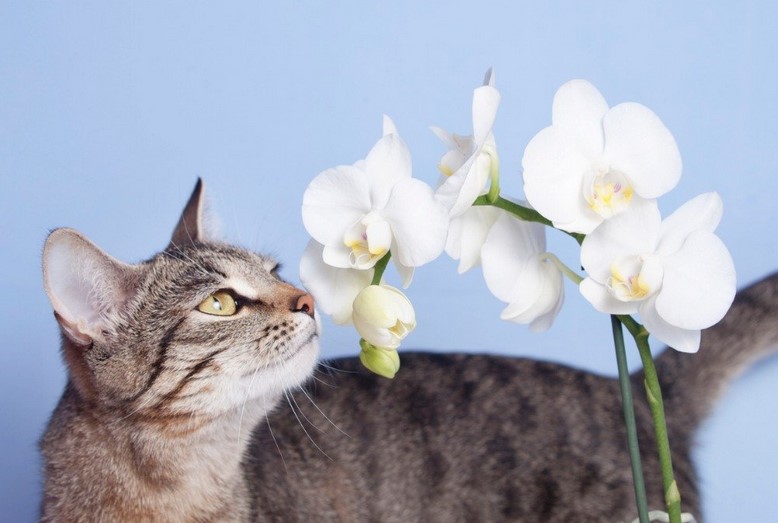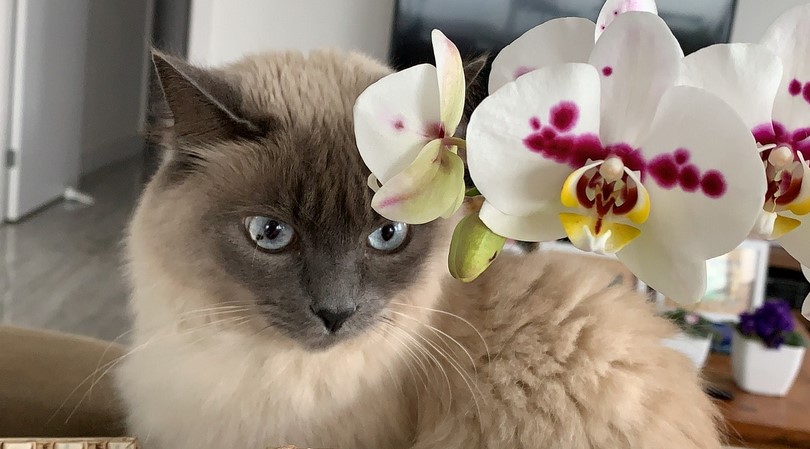If you have a cat, you may want to consider separating your plants from your cat. Make sure that they have a separate area, such as a sunny room in the garden. This space is also a wonderful stress-relieving refuge. However, be sure to place a cat-proof door or gate in this room to keep your cat out. Cats are known to despise boundaries, so they will express their dissatisfaction in a direct manner. Regardless of your reasoning, you should remain firm and vigilant to your cat’s safety and the health of your orchids.
March is here and fresh flowers are everywhere! But, not all cats and flowers mix. In fact, quite a few are toxic to kitties we’re talking mouth burns, swollen tongues and cheeks, vomiting, and even paralysis! This is serious business as cats will typically chew on things they find interesting and sometimes that includes plant leaves or stems. We love our pets and want their comforts and safety to be a top priority. Not only will I answer the question “Are Orchids Poisonous to Cats” but I’ll provide an extensive list of cat safe plants as well as a list of toxic plants for cats.

Phalaenopsis orchids
Do Phalaenopsis orchids really cause harm to cats? It’s important to know that this particular plant does not fall into the category of a toxic plant, but you still need to be cautious around them. Even if they’re not poisonous, they can cause a rash or blister. You should avoid giving them to your cat if you’re unsure.
Cypripedium species
Despite the fact that Cypripedium species are generally non-toxic to cats, you should consult a professional before growing them in your home. According to the University of California at Davis, the pink-and-white lady slipper orchid is slightly toxic to cats. The University of California at Davis says that there are over 25000 species of orchids, and your cat should be monitored for signs of toxicity if it comes into contact with any of them.
Cayenne pepper
Cats can be attracted to certain plants and flowers, including orchids and cayenne pepper. Cats will spit cayenne pepper out of their noses and paws, making them uncomfortable and potentially toxic to their health. While cayenne pepper isn’t harmful to most plants, it’s best to avoid it altogether if you want your garden to remain a cat-free zone.
Tulips
If you have accidentally given your cat tulips, you should take it to a veterinarian immediately. It may look like a normal rash, but your pet might actually be suffering from an illness caused by Tulips. This is because they contain Tulipalin A and B, two antibacterial compounds found in tulips. The plant’s pollen and tulip extracts are extremely toxic to cats, and cats’ skin and immune systems are extremely delicate. This is why your pet must be kept away from tulips at all costs.
Daffodils
The poisonous qualities of daffodils can cause a variety of symptoms in cats. They include decreased blood pressure, diarrhea, excessive drooling, vomiting, and tissue irritation. If ingested, daffodils can also result in heart arrhythmias and respiratory depression. However, cats rarely die from daffodil poisoning. If you suspect that your cat may have consumed daffodils, visit your veterinarian immediately.
Tulips are poisonous to cats
Fortunately, tulip poisoning is not fatal for cats. Ingestion of the flower can result in vomiting, diarrhea, and general discomfort. Older cats may become dehydrated and experience respiratory failure. Healthy cats usually show no signs of toxicity. If your cat has eaten tulips, contact your veterinarian to prevent the symptoms from becoming more serious. If you suspect that your cat has ingested tulips, the first step is to monitor your cat.

Daffodils are poisonous to humans
The basic chemical that makes daffodils poisonous to humans is lycorine, which can be deadly if ingested. The most harmful daffodil chemical is lycorine, which is a powerful emetic and affects the nervous system. It also inhibits protein synthesis. While this daffodil chemical is not fatal to humans, it is poisonous to animals, including humans.
Orchids contain a toxin making them toxic to both cats and dogs. Symptoms of this toxicity can be slowed heart rates, vision problems, vomiting and abdominal pain. Another plant that should be avoided is philodendron. This type of plant has caused the deaths of numerous cats and dogs in the United States because it can cause respiratory distress. We suggest you do your research to avoid this deadly disaster with your pet.

